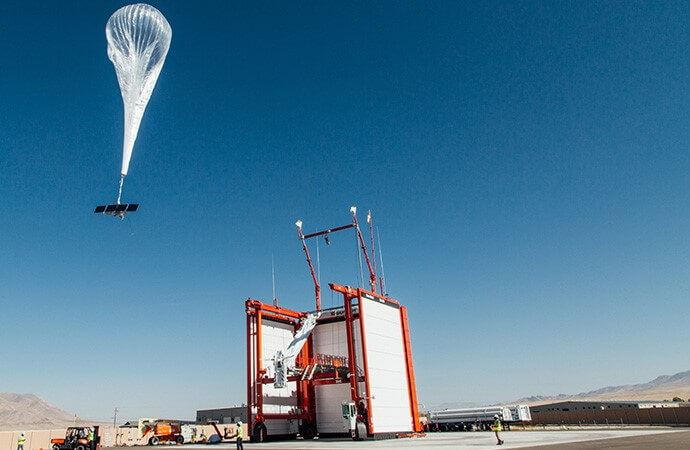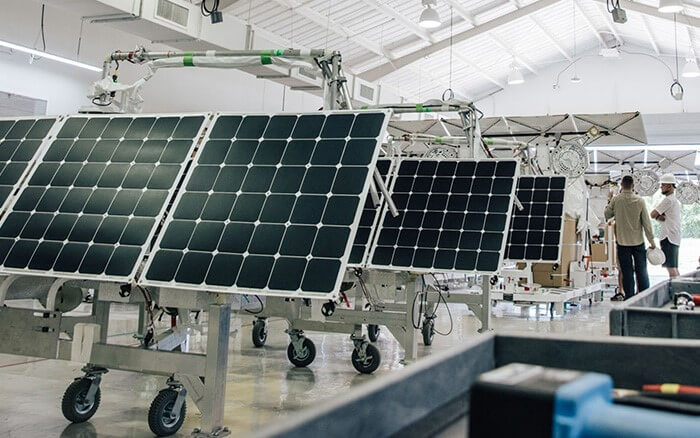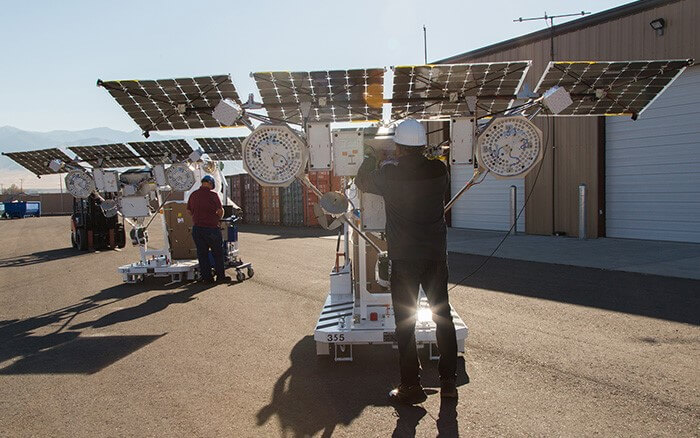Helping the World from Above

Without warning, a magnitude 8.0 earthquake strikes.
After what seems like an eternity, the violent tremors cease. Thousands of survivors are left without food, clean water or electricity.
Most lines of communication are destroyed. Families can’t contact loved ones. Local officials struggle to coordinate delivery of critical supplies.
But as the crisis unfolded on the ground in Peru, something truly remarkable was happening high overhead.
At the edge of space, several stratospheric balloons moved into position and began delivering internet connectivity to the stricken communities below. All within 48 hours.

A tennis-court sized Loon balloon launches from its custom platform. All onboard electronics are powered by Maxeon® solar technology and a rechargeable battery.
For the survivors of that unforgettable Sunday morning in 2019, it was help from above.
All thanks to a revolutionary network of high-altitude balloons created and operated by Loon, one of Alphabet’s newest independent businesses (formerly a part of Google [X]). By redesigning the essential components of a cell tower so they can be carried high above Earth, the pioneers at Loon have provided emergency internet connectivity to hundreds of thousands of victims of natural disasters. Loon is also making it possible to extend internet access to countless unserved and underserved communities around the world.
A Stratospheric Challenge
An elegantly simple idea on its surface, the Loon balloon network is one of the most complex and demanding challenges ever undertaken in the realm of science, engineering and technology. Only the best and brightest have been selected to take part in what has become an incubator of scientific brilliance. Which is why Maxeon Solar Technologies is humbled and honored to be the sole provider of solar technology for Loon since its first official launch in 2013.
Much like a group of cell towers on the ground, Loon balloons form a network to serve a specific geographical area. But these “towers” are constantly moving, and must be guided up or down to reach the specific layer of wind that will blow them in the desired direction. This precise choreography requires a host of advanced on-board equipment, all powered by our solar technology: a navigation system using complex algorithms and software. A specialized solar pump to control air pressure and altitude. A rechargeable battery to store solar power for nighttime use. Sophisticated weather monitoring devices, and more. Successful operation requires each component to be highly reliable, extremely durable and incredibly lightweight. And the solar power source is no exception.
A First-Ever Solar Solution
From the outset, our engineers were confident that our solar technology was ideal for Loon. They knew that the very same Maxeon® solar cells found on rooftops around the world could withstand the extreme weather conditions of the stratosphere – including intense UV radiation levels, 100 km/hr winds and temperatures as low as -90 degrees Celsius.
They also knew that homes and businesses with Maxeon solar cells produce 35% more energy over 25 years in the same space as other solar.1 SunPower 400 W, 22.6% efficient, compared to a Conventional Panel on same-sized arrays (310 W mono PERC, 19% efficient, approx. 1.64 m²) Generating enough power to keep Loon’s vital systems running day and night, even within such a small surface area, was achievable.
So Maxeon's team in France got to work manufacturing highly-specialized solar panels to meet Loon’s exacting specifications. By developing an exceptionally thin panel structure and stripping out every gram of non-essential weight, they painstakingly crafted a first-ever solar solution: a feather-light, 1-kilogram panel capable of producing 165 watts of clean power. The SunPower stratospheric solar power system for Loon was a reality.

Custom Maxeon 165W panels await deployment aboard Loon balloons.
A High-Flying Vision
Today, Loon is well on its way to fulfilling its ambitious mission: to connect people everywhere by inventing and integrating audacious technologies. As pioneers in atmospheric modeling, materials science, machine learning, communications systems and renewable energy, their accomplishments thus far are remarkable:
Peru, 2019:
When a devastating 8.0 magnitude earthquake struck Peru and surrounding area, Loon re-directed a group of nearby balloons, serving critical LTE service to survivors and local authorities in record time.
Puerto Rico, 2017:
After Hurricane Maria made landfall and caused widespread damage to the island’s infrastructure, Loon worked with governmental agencies and international aviation authorities to bring desperately-needed internet connectivity to the hardest hit areas.
Peru, 2017:
Extreme rains and heavy flooding displaced tens of thousands of people in and around Lima, with Peruvian government officials declaring a state of emergency for more than 800 provinces.
The Next Level for Loon
In addition to providing relief to disaster areas, Loon is broadening its impact. They are currently working with telecommunications companies and governments to provide connectivity to unserved and underserved communities around the globe. We is proud to provide solar expertise to the pioneers at Loon as they shape a safer, more connected future.
Loon: Quick Facts
Mission: Connect people everywhere.
Energy: Custom 165 watt Maxeon® solar panels by day, rechargeable battery at night
Flight Altitude: 18,000 - 23,000 meters
Stratospheric Conditions: Temperatures as low as -90 degrees Celsius. Air pressure is 99% lower than at sea level. Thin atmosphere offers little protection from UV radiation.
Flight Duration: More than 100 days before a controlled landing.
Flight Duration Record: 223 days, a stratospheric flight record for any aircraft.
Cumulative Flight Time: More than 1 million hours.
Cumulative Flight Distance: More than 40 million kilometers, enough to circle the earth 1,000 times.
